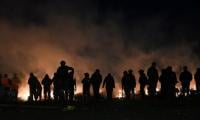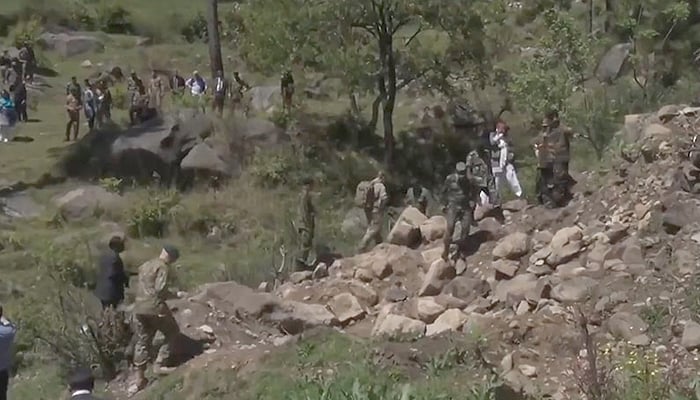IB is not what it appears to be
Intelligence Bureau has not only made landmark achievements its scope of activities has also broadened, says report
ISLAMABAD: The Intelligence Bureau (IB) is not what it appears to be. The agency has not only made landmark achievements, its scope of activities has also broadened. At least, this is what reflects in its year-book.
The year-book (2022-23) contains what the IB has done under the watch of Fuad Asad Ullah Khan, the first officer of the agency rising to the rank of director general. In other words, this is his annual confidential report.
Not only the IB led on counter-terrorism front, the agency has expanded its scope to economic intelligence, helping other departments in meeting the FATF requirements and conducting raids against those involved in economic crimes. Other than human and technical intelligence, it is now using imagery and social media intelligence to trace the culprits.
In December 2022, for example, a short video clip went viral focusing in on the Parliament House building which was apparently posted by Tehreek-i-Taliban Pakistan. The IB determined after a careful examination that the clip was filmed at Trail-3 of Margalla Hills and identified one Daniyal Ahmad who had filmed and uploaded it. He was traced in Swabi, arrested and handed over to the Counter Terrorism Department (CTD) Police, Islamabad.
The agency also unearthed a network linked with Indian intelligence which was found involved in mapping the site used for surgical strikes in Balakot. In January 2021, the IB caught a former militant, Salimullah, filming a strategic military installation in Kashmir. Interrogation revealed that he was working under the direction of Germany-based Ayesha Sheikh, allegedly linked with RAW, which recruited people using platforms like Facebook, Bigo and TikTok.
Through these operatives, the Indian intelligence would map out vital installations in several cantonments. Again, this was the network which had mapped the site in Balakot used for surgical strikes by India.
Another intended mission was to station spies at important military installations. The IB unmasked 25 such agents.
As killings of Kashmiri leaders in different cities was a mystery for the law enforcement agencies, the IB unearthed the network who killed Khalid Raza of Al-Badar Mujahideen and Zahid Ibrahim of Hizb-ul-Mujahideen. It discovered a network led by an ex-Rangers commando, Muhammad Ali. All of its members were apprehended. Muhammad Ali admitted working for RAW since 2017 other than revealing that he had conducted surveillance of Hafiz Saeed and of Hamza, the son of Fazlur Rehman Khalil on the direction of Indian intelligence.
The year book also contains details how a Daesh plan to attack President Arif Alvi during his visit to Sibi Mela was averted. After getting information that Daesh’s Islamic State Pakistan Province (ISPP) branch was planning to target Alvi, the presidential security was beefed up. In desperation, the bomber exploded himself after the President left, martyring seven FC officials.
It turned out the bomber was Daesh leader, Ziaur Rehman, in Kachhi and Sibi districts where the ISPP had moved after losing ground in the suburbs of Quetta.
The IB solved several other terrorism related cases. It arrested the terrorists who had attacked the Ziarat Residency, coordinated with police in operation against an infamous gangster, Bilal Sabit, who was killed in police encounter, solved the murder of former home minister of Punjab Col (R) Shuja Khanzada, averted attacks on Chinese in Karachi, foiled attempts aimed at police installations in Rawalpindi. In total, it conducted 315 successful intelligence-based operations in one year. The agency lost its brave officers who were target-killed.
The agency’s economic wing worked together with financial institutions to address the structural deficiencies in order to address the FATF requirements. In this regard, it shared 91 pivotal financial intelligence leads with various agencies. It went after the dealers of hundi/hawala identifying 722 such individuals and 187 dubious foreign exchange companies. The agency was also active against the hoarders, smugglers and traffickers.
Its report resulted in actions against 405 fertilizer hoarders, 64 smugglers of fertilizers, 592 wheat hoarders, 26 wheat smugglers and 167 human traffickers. One such case was the arrest of Fateh, the son of Zahir Shah who had an elaborate network of human trafficking.
Fateh’s role was to receive potential would-be illegal immigrants from different parts of the country in Quetta and send them to Yakmuch, a town located at the Pakistan-Iran border.
-
 'Bridgerton' Season 4: Showrunner Talks About Violet's Steamy Romance
'Bridgerton' Season 4: Showrunner Talks About Violet's Steamy Romance -
 John Tesh Recalls ‘uncomfortable’ Backlash Over ’70s Romance With Oprah Winfrey
John Tesh Recalls ‘uncomfortable’ Backlash Over ’70s Romance With Oprah Winfrey -
 Meghan Markle, Prince Harry Problem Was Not ‘work’ During Time With Royals
Meghan Markle, Prince Harry Problem Was Not ‘work’ During Time With Royals -
 Meta Strikes Multi-billion-dollar AI Chip Deal With Google: Will The New Collaboration Pay Off?
Meta Strikes Multi-billion-dollar AI Chip Deal With Google: Will The New Collaboration Pay Off? -
 Gracie Abrams Breaks Silence After Losing 2026 BRIT Award
Gracie Abrams Breaks Silence After Losing 2026 BRIT Award -
 Deon Cole Takes Swipe At Nicki Minaj In Mock Prayer During NAACP Image Awards Monologue
Deon Cole Takes Swipe At Nicki Minaj In Mock Prayer During NAACP Image Awards Monologue -
 Jennifer Garner Reveals The Actress Who 'carried Through Things'
Jennifer Garner Reveals The Actress Who 'carried Through Things' -
 Shamed Andrew ‘awful’ Time As Trade Envoy Is Laid Bare By Insider
Shamed Andrew ‘awful’ Time As Trade Envoy Is Laid Bare By Insider -
 Belgium Seizes Suspected Russian Shadow Fleet Tanker
Belgium Seizes Suspected Russian Shadow Fleet Tanker -
 Liza Minelli Makes Bombshell Claim About Late Mother Judy Garland’s Struggle With Drugs
Liza Minelli Makes Bombshell Claim About Late Mother Judy Garland’s Struggle With Drugs -
 Shipping Giant Maersk Halts Suez Canal, Bab El-Mandeb Sailings Amid Escalating Conflict
Shipping Giant Maersk Halts Suez Canal, Bab El-Mandeb Sailings Amid Escalating Conflict -
 Matthew McCoughaney Reveals One 'gift' He Achieved With Losing Nearly 50 Pounds
Matthew McCoughaney Reveals One 'gift' He Achieved With Losing Nearly 50 Pounds -
 'Scream 7' Breaks Box Office Record Of Slasher Franchise: 'We Are Grateful'
'Scream 7' Breaks Box Office Record Of Slasher Franchise: 'We Are Grateful' -
 Bolivian Military Plane Crash Death Toll Rises To 20
Bolivian Military Plane Crash Death Toll Rises To 20 -
 'Sinners' Star Blasts Major Media Company For 2026 BAFTAs Incident
'Sinners' Star Blasts Major Media Company For 2026 BAFTAs Incident -
 Inside Scooter Braun, Sydney Sweeney's Plans To Settle Down, Have A Baby
Inside Scooter Braun, Sydney Sweeney's Plans To Settle Down, Have A Baby




